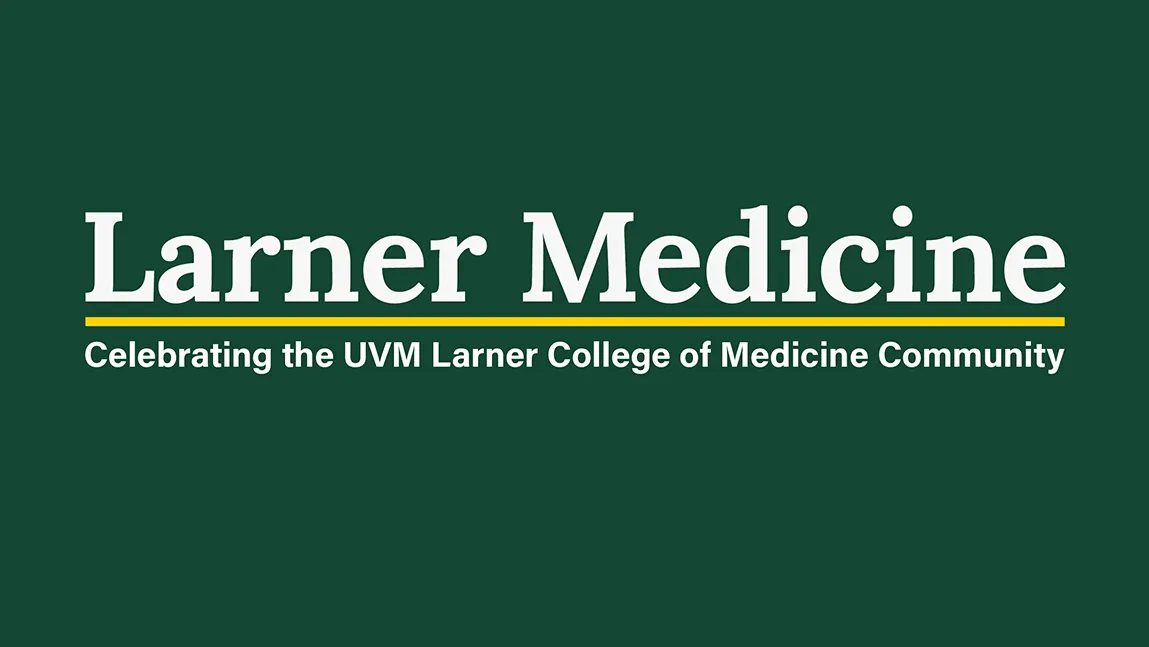
Like many medical student couples, Larner graduate Anupama Balasubramanian, M.D.’25, and her then-fiancé, Harsh Moolani, M.D., who went to the University of Miami Miller School of Medicine, were very stressed during the couples matching process for securing the next step in their medical careers—residency. Couples matching is fraught with seemingly insurmountable choices: How to rank 300+ combinations? Whose career matters more? What to sacrifice?
Inspired by their own experience navigating the intricacies of the couples match, Balasubramanian and Moolani have launched a new platform called couplesmatchtool.com to help medical couples optimize their match lists. This free resource pulls data from the National Resident Matching Program and other objective sources, rather than relying on self-reported information. The tool transforms emotional deadlocks into clear decisions by quantifying the unquantifiable with an algorithm centered around personal preferences, distance, etc.; ending the “my career vs. yours” tension; and converting gut feelings into strategic rankings.
Balasubramanian and Moolani matched at their #1 combination: she in anesthesiology at New York Presbyterian Weill Cornell Medical Center, and he in neurology at NYU Langone Health just a few miles down the street. They were married in May 2025.
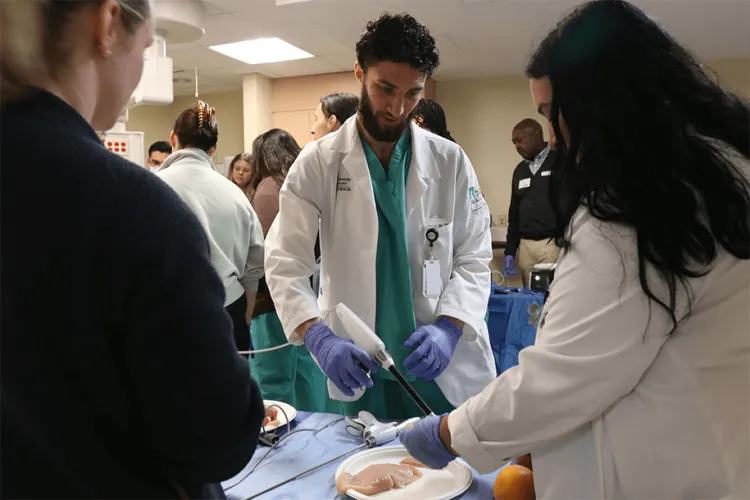
At the Larner College of Medicine’s clinical branch campus in western Connecticut, Danbury Hospital’s Harold A. Spratt Center for Simulation and Clinical Learning recently achieved five-year accreditation from the American College of Surgeons (ACS) as a Focused Accredited Education Institute (AEI). This prestigious accreditation shines a light on the institution’s commitment to advancing patient safety and high-quality surgical care through innovation in education.
Medical students and residents use the Spratt Center to build hands-on skills in suturing, laceration repair, endoscopic and laparoscopic procedures, robotic-assisted surgery, trauma care and even clinical, patient, and family communication—all in a safe environment to equip them for real-world scenarios.
“Surgical simulation is a top way to teach learners in a safe space to learn before a real operation,” says Krishan Patel, M.D., clinical assistant professor of surgery for the Larner College of Medicine and surgical director for the Spratt Center. “Surgical education has changed dramatically over the last 20 years, with more innovation and surgical options than ever before.”
The AEI accreditation is a rigorous, voluntary peer-review process that includes a comprehensive onsite survey and evaluation of the simulation center’s people, curriculum, governance, and impact on the field of surgical education. In its review, ACS noted that the Danbury Hospital simulation center plays a vital role within the health system, it is particularly strong in its governance and assessment practices, and it is well positioned for continued growth and leadership in simulation-based education. The surveyor also highlighted how Danbury Hospital’s integration with the University of Vermont Larner College of Medicine, which is also AEI accredited, contributed to making significant strides in simulation-based surgical education.
“We work in conjunction with the sim lab at the Connecticut campus and strive to ensure identical simulation experiences for students at both campuses,” said Daniel Ackil, D.O., associate professor of emergency medicine and assistant dean of clinical simulation at the Vermont campus
With this accreditation, the Spratt Center joins a worldwide movement to improve surgical training and patient safety. It will now have access to shared research opportunities, innovative curricula, and collaboration with other simulation leaders.
“We were delighted to get the accreditation recognizing our robust surgical services education curriculum,” said Ramanathan Seshadri, M.D., clinical assistant professor of surgery for the Larner College of Medicine and director of simulation at the Spratt Center. “This gives us a platform to collaborate with other leading centers and further our goal of being a national leader in patient safety, team-based care, and improving the patient experience.”
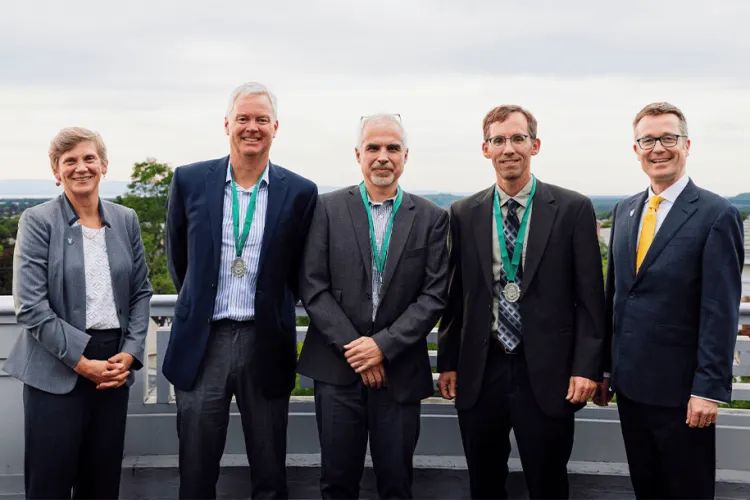
Larner College of Medicine Green and Gold Professor of Surgical Research Brian Sprague, Ph.D., a member of the UVM Cancer Center, was among honorees inducted into the 45th Class of University Scholars at the University of Vermont. Dr. Sprague, who received a monetary award in the category of basic and applied sciences, is nationally and internationally recognized for his research in breast cancer screening and surveillance.
In addition to his work with the UVM Cancer Center, Dr. Sprague leads the UVM Office of Health Promotion Research and co-leads the UVM Cancer Center’s Population Sciences and Cancer Outcomes research program. Through both roles, he is dedicated to mentoring early-career investigators and working with trainees from undergraduates to clinical fellows.
The annual University Scholars Awards, co-sponsored by the Provost and the Graduate College, honor and recognize distinguished UVM faculty members for sustained excellence in research, creative, and scholarly activities.
Read more about Dr. Sprague’s University Scholars Award
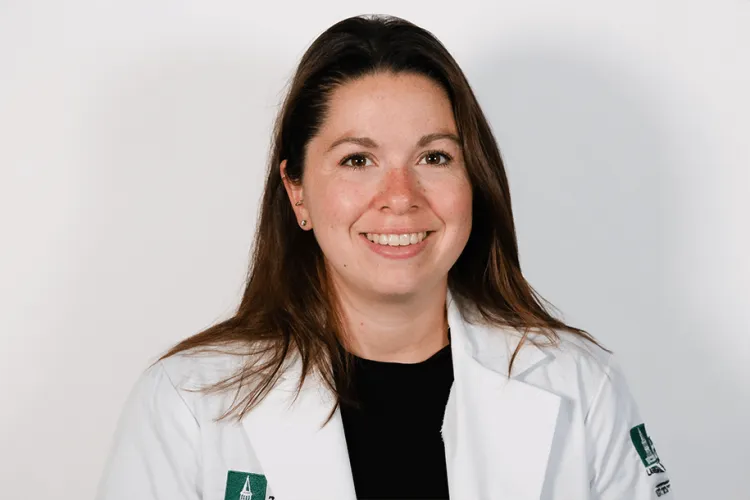
In October, for Vermont Health Careers Awareness Month—a time to recognize and celebrate the vital role of health professionals in our state—a recent episode of the Southern Vermont Area Health Education Center (AHEC) Let’s Talk podcast featured Molly Hurd, a fourth-year medical student at the Robert Larner, M.D. College of Medicine at the University of Vermont. Hurd, an AHEC Scholar, shares her honest and inspiring journey into medicine and her hopes of practicing rural family health care.
Listen to Molly Hurd on the Let’s Talk podcast.
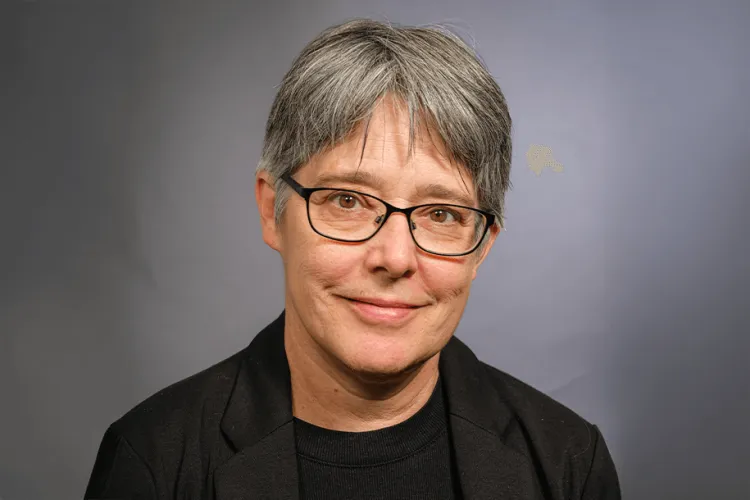
Brigitte Lavoie, Ph.D., assistant professor, research scholar pathway, in the Department of Neurological Sciences, was recently awarded an R01 grant from the National Institute of Health’s National Institute of Diabetes and Digestive and Kidney Diseases. The project, “Modulation of gut and brain serotonin signaling by tryptophan producing bacteria,” will test the hypothesis that treatment of mice with bacteria that generate tryptophan can improve gastrointestinal motility and affect anxiety and depression. This study aims to develop a translational strategy to use individual microbes to treat these disorders Sayamwong Hammack, Ph.D., professor of psychological science and director of the neuroscience graduate program, is co-investigator on this five-year, $2,184,753 grant.
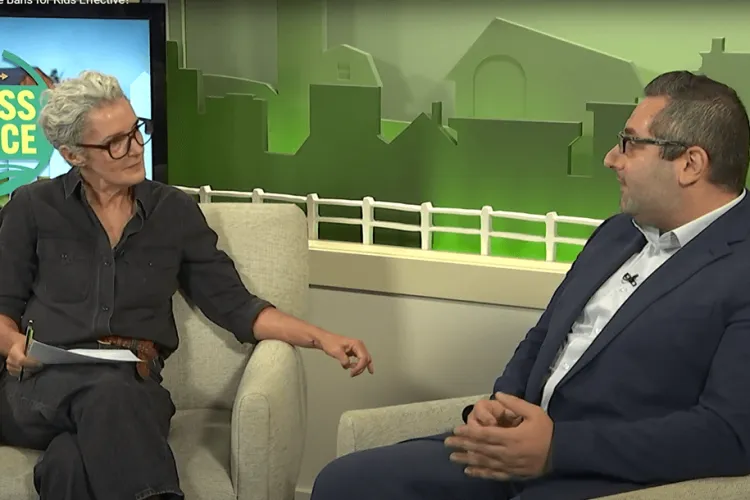
Neuroscientist Bader Chaarani, Ph.D., assistant professor of psychiatry at the Larner College of Medicine, was featured in a recent episode of the University of Vermont Extension’s Across the Fence TV program speaking with program host Amy Finley about how and why we should manage kids’ screentime. How bad are screens, really, and is the problem the screens themselves or the content? Are cell phone bans part of the solution?
Across the Fence is a daily 15-minute television program co-produced by UVM Extension and WCAX-TV informing viewers about activities being conducted by University of Vermont faculty, staff, and students that benefit viewers and their communities. The longest-running farm, home, and community television program in the country, Across the Fence airs weekdays at 12:15 p.m. on WCAX-TV Channel 3.
Watch Dr. Chaarani on Across the Fence
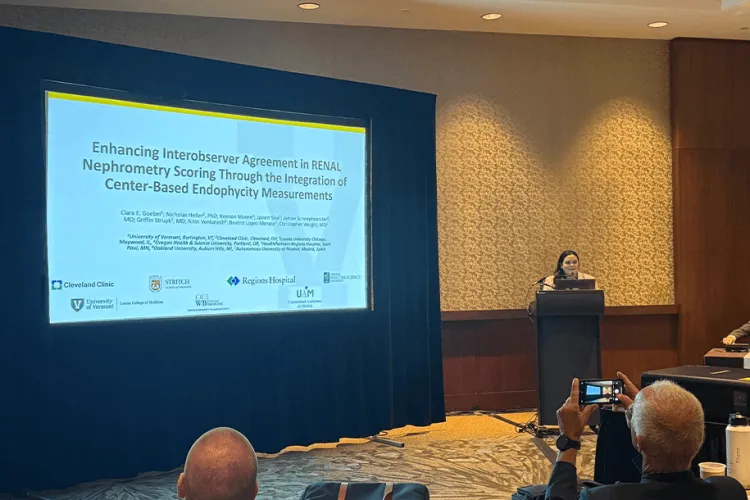
Four medical students from the Larner College of Medicine presented research at the New England American Urological Association’s (AUA) 94th Annual Meeting, held September 4–6 in Boston:
- Jake Bleau ’26, “Higher Frequency of Stone-Related Procedures in Patients with Neurogenic Bladder: A National Review Using a Live Database”
- Clara Goebel ’27, “Enhancing Interobserver Agreement in RENAL Nephrometry Scoring Through the Integration of Center-Based Endophycity Measurements”
- Angelina Kuzina ’26, “Reoperation Risk in Distal Hypospadias: A Multicenter Study Utilizing the Live TriNetX Claims Database”
- Ben Rubin ’27, “Evaluating Evolving Treatment Pathways for Interstitial Cystitis / Bladder Pain Syndrome (IC/BPS) Utilizing Multi-Institutional Data from TriNetX” and “National Analysis of Post-Procedural Urinary Incontinence Following Benign Prostatic Hyperplasia Treatments Using a Live Claims Database”
Goebel was a student mentor for the meeting’s FUTURE program, and AUA FUTURE mentees Shane Cauley ’28, Sidney Gregorek ’28, Sarah Kohl ’26, and Amin Rasheed ’28 also attended the meeting. The American Urological Association FUTURE in Urology program is an incubator for pre-clinical and third-year medical students from all demographic backgrounds who are dedicated to increasing the urology workforce and supporting equitable health care.
Read a blog post by Goebel and Kohl, along with Nicholas Khoo ’27, about the 2024 New England Section of the American Urological Association’s Annual Meeting FUTURE Program.
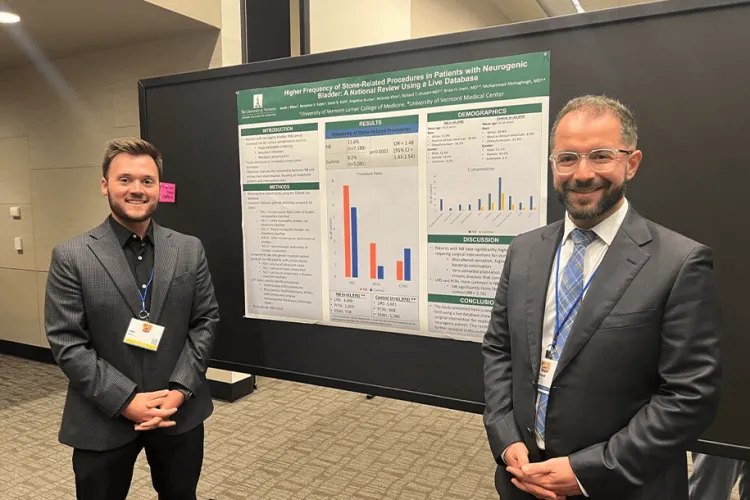
Jake Bleau ’26 presented projects on incontinence complications after benign prostatic hyperplasia surgery and nephrolithiasis surgery patterns in patients with neurogenic bladder at the 42nd World Congress of Endourology and Uro‑Technology, which took place September 8–12 in Phoenix. This annual gathering serves as a premier forum for the advancement and dissemination of minimally invasive urologic surgical techniques.
Benign prostatic hyperplasia, or BPH, is a condition in which the prostate gland is enlarged, leading to urinary symptoms, such as difficulty urinating, weak urine flow, and frequent urination. Surgical options—such as TURP, laser surgery, and minimally invasive techniques—often need to be considered when medications fail to relieve symptoms. Neurogenic bladder is a condition that affects bladder function due to nervous system problems. It occurs when a problem with one’s brain, nerves, or spinal cord causes loss of control of the bladder. Management options include lifestyle changes, catheterization, and medications to help control symptoms.
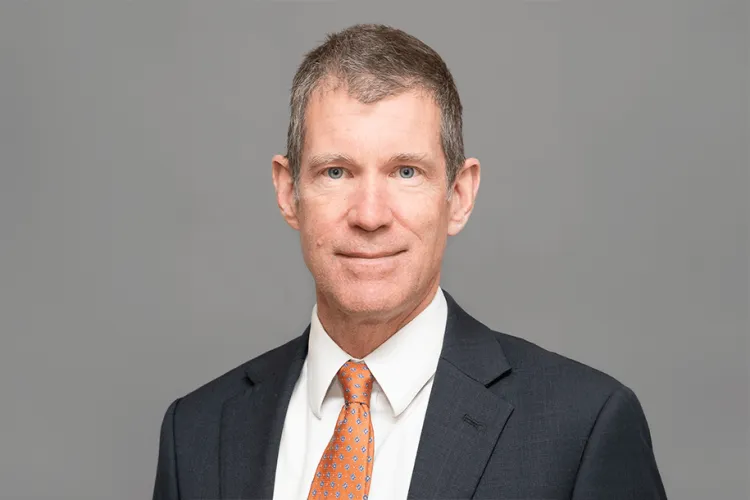
Allen Mead, M.H.S.A., vice president of medical group network departments at the Robert Larner, M.D. College of Medicine at the University of Vermont, has been selected to receive the Academic Internal Medicine (AIM) Distinguished Service Award, recognizing an AIM member who has made significant contributions to the field of administration of academic internal medicine by scholarly activity that advances the knowledge base or best practices, by role model leadership in the profession, and by fostering collegiality among our membership.
Each year the Alliance for Academic Internal Medicine (AAIM) and its charter associations honor members of the academic internal medicine community for outstanding leadership, dedication, and service to the profession and the organization through the AAIM Awards Program. The 2026 recipients represent an outstanding group of academic internal medicine professionals who have been recognized for their exceptional leadership, dedicated service, and astounding achievements. Join us in congratulating these individuals for their contributions to academic internal medicine.
The Alliance will honor the 2026 awards recipients during Academic Internal Medicine Week 2026, held April 19-22, in Seattle, Washington.
View all Accolades & Accomplishments in the Larner Medicine newsletter archives
